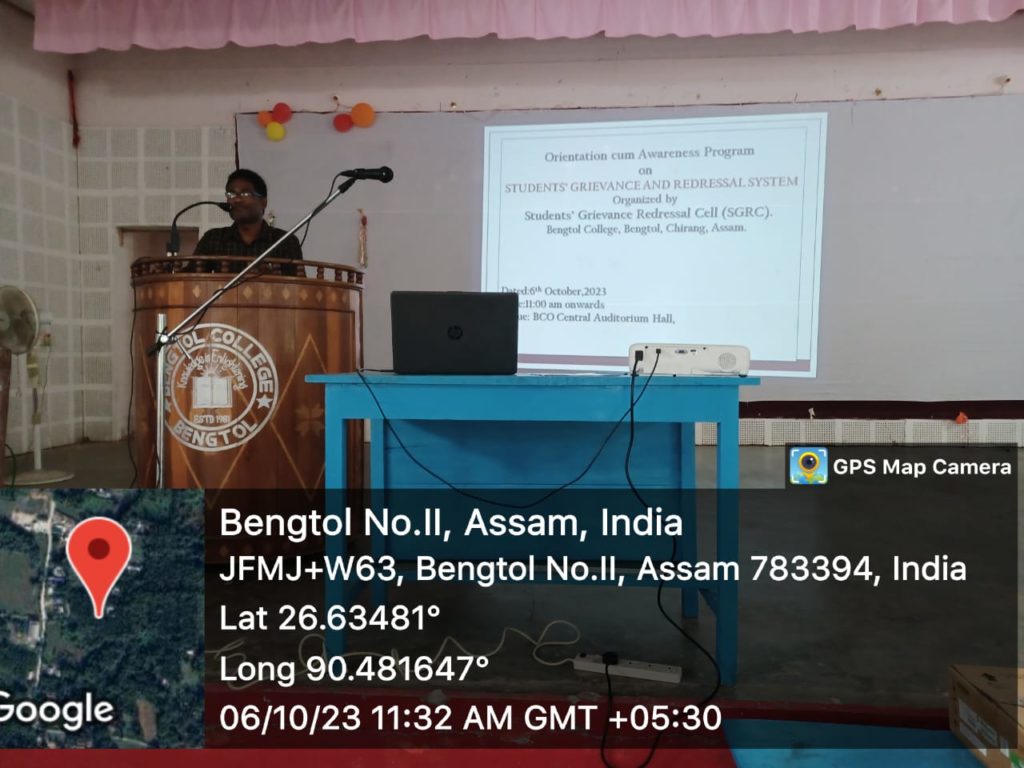The Students’ Grievance and Redressal Cell, Bengtol College has organized an Orientation cum Awareness program on Students’ Grievance and Redressal System of the college today on 6th October 2023 at BC Owary Auditorium Hall of Bengtol College.
The main purpose of the program was to bring awareness about the opportunities for redressal of certain grievances of students already enrolled in the college, and a mechanism thereto and to educate the students community about the existence and functioning of the Grievance and Redressal cell.
The program was chaired by Mr. Sahidul Islam Akand, Associate Prof. Department of Education, and delivered his Welcome Address with a warm welcome to all participants. He explained the purpose and importance of the grievance redressal system in the college and handed over to Mr. Sangrang Borgoary, (Chair Person), Students Grievance and Redressal Cell to take his time for delivering his orientation speech and PPT Presentation on the program. He introduced all the members of the cell, Mr. Dharmendra Baro, Asstt. Prof. Dept. of English, Mr. Sahidul Islam Akand, Associate Prof. Dept. of Education, Dr. Ranjit Basumatary, Asstt. Prof. Dept. of Economics, Mrs. Ebria Khakhlari, Asstt. Prof., Dept. of History and General Secy. Of Bengtol College Students’ Union. He explained all the opportunities for the redressal of students already enrolled in the institution. In his presentation, he gave an overview of how the grievance redressal system is structured, including the composition of the grievance committee, discussed the different types of grievances that students may encounter, such as academic, administrative, and interpersonal issues, Filing a Grievance: Explain the step-by-step process for filing a grievance, including where to submit complaints and the required documentation. Support Services: Highlight the various support services available to students, such as counselling, academic advising, and mentorship. Followed by Question & Answer Session which allowed students to ask questions and clarify any doubts they may have. The Chairperson concluded his speech and presentation of the program by emphasizing the college’s commitment to addressing students’ concerns.
Outcome of the Programme:
Here are some of the key outcomes:
- Increased Awareness and Knowledge: Students will have a better understanding of the existence and functioning of the grievance redressal system in the college. They will know how to identify different types of grievances and the appropriate channels for reporting them.
- Empowered Students: The program empowers students to speak up and seek redressal for their concerns or issues, knowing that a structured system is in place to address their grievances. This empowerment can boost their confidence and sense of agency.
- Improved Grievance Reporting: With increased awareness, students are more likely to report grievances promptly and accurately, which can lead to faster resolution of issues and a more positive learning environment.
- Enhanced Trust and Confidence: The program can build trust between students and the college administration, as students will see that the institution is committed to addressing their concerns in a fair and transparent manner.
- Resolution of Issues: By promoting the use of the grievance redressal system, the program contributes to the resolution of academic, administrative, and interpersonal issues, ultimately improving the overall college experience for students.
- Reduction in Conflict: When students are aware of proper channels for addressing grievances, it can lead to a reduction in conflicts and disputes, as issues can be resolved through established processes rather than escalating into confrontations.
- Positive Campus Culture: An effective grievance redressal system and awareness program contribute to a positive campus culture where students feel supported, valued, and heard.
In summary, an Orientation cum Awareness program on the Students’ Grievance and Redressal System can lead to a more informed and empowered student body, a more supportive campus culture, and ultimately, improved educational outcomes and satisfaction for all stakeholders within the college community.











